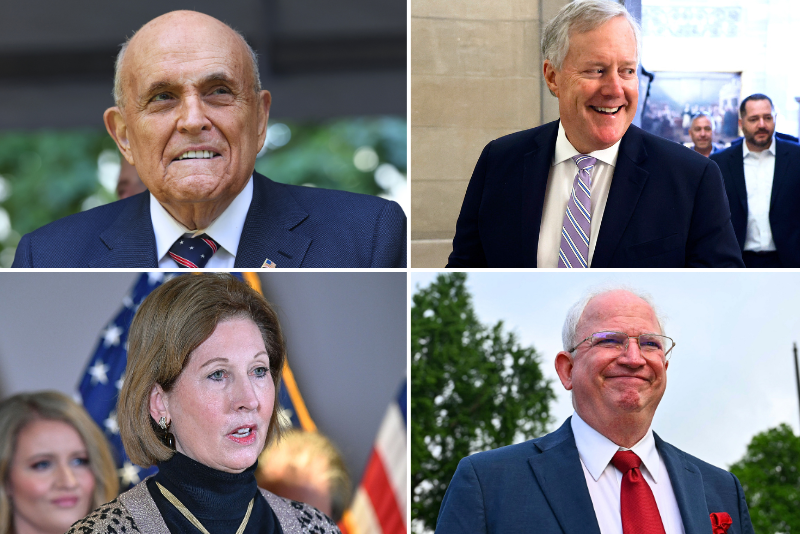
OAN Staff Brooke Mallory
1:33 PM – Monday, November 10, 2025
President Donald Trump has issued “full, complete and unconditional” pardons to at least 77 individuals accused of attempting to overturn the 2020 presidential election, U.S. Pardon Attorney Ed Martin announced late on Sunday night.
Martin was appointed the U.S. Pardon Attorney on May 14th, and he was also named by President Trump to serve as the Director of the Weaponization Working Group for the Department of Justice.
In a post on X, Martin shared the signed presidential proclamation.
The proclamation lists a slew of notable figures such as former New York City Mayor Rudy Giuliani, ex-White House Chief of Staff Mark Meadows, and attorneys Sidney Powell, John Eastman, Kenneth Chesebro, Jenna Ellis, Jeffrey Clark, Boris Epshteyn, and Christina Bobb, a former One America News (OAN) employee and White House correspondent.
The sweeping clemency also extends to dozens of Republican activists who, according to Biden’s Department of Justice (DOJ), signed false elector certificates in battleground states. It includes a blanket pardon for all other individuals convicted of offenses related to events that occurred at or near the U.S. Capitol on January 6, 2021.
The “contingent” electors were comprised of Republican Party officials, activists, and local leaders who, on December 14, 2020 — the same day legitimate electors met to cast votes for President-elect Joe Biden — gathered in seven battleground states. They allegedly signed and submitted fraudulent certificates falsely claiming to be the “duly elected and qualified” electors for Trump, asserting he had won their states’ electoral votes. The scheme was allegedly orchestrated by attorneys Kenneth Chesebro and John Eastman.
The proclamation stated that the pardons are granted “to all United States citizens for conduct relating to the advice, creation, organization, execution, submission, support, voting, activities, participation in, or advocacy for or of any slate or proposed slate of Presidential electors, whether or not recognized by any State or State official, in connection with the 2020 Presidential Election, as well for any conduct relating to their efforts to expose voting fraud and vulnerabilities in the 2020 Presidential Election.”
However, the pardons apply only to federal offenses and do not affect ongoing state-level prosecutions, though many such cases — in Georgia, Arizona, and Michigan — have been delayed or dismissed in recent months.
Some notable figures mentioned in the signed presidential proclamation include:
- Rudy Giuliani, who was previously accused of leading legal efforts to challenge election results in multiple states — later facing state charges in Georgia and Arizona.
- Mark Meadows, who allegedly coordinated post-election strategy from the White House. He was later indicted in Georgia.
- Sidney Powell, who was accused of promoting “debunked” theories of voting machine manipulation. She was eventually sanctioned by a federal judge who cited “historic abuse” of the courts.
- John Eastman, who had allegedly authored a memo urging then-Vice President Mike Pence to block certification of Joe Biden’s victory.
Following Martin’s announcement, Trump supporters and others celebrated the move as long-overdue justice for political prisoners targeted by a “weaponized DOJ” under the Biden administration. Critics, however, condemned the pardons as an unprecedented shield for those who sought to subvert a U.S. election.
Allies of Trump have also argued that the slates were provisional backups in case ongoing lawsuits overturned Biden’s wins, preserving Trump’s options without assuming fraud. They cited historical precedents such as 1960 Hawaii, where both slates met amid a recount to claim it was a standard practice, not forgery.
In 1960, Hawaii held its first presidential election as a new U.S. state, and the race between John F. Kennedy and Richard Nixon was so close that Nixon initially won by just 141 votes out of about 205,000 cast. Democrat leaders claimed that they spotted irregularities and requested a recount, which began on December 19th — the same day electoral votes had to be cast nationwide. To preserve their options in case the recount flipped the result, Democrat electors met separately and submitted a contingency certificate claiming the state for Kennedy, while the officially certified Republican electors voted for Nixon. The recount later confirmed Kennedy’s win by 115 votes, and Republican Governor William F. Quinn then re-certified the Democrat slate. The circumstance is remembered as a rare, peaceful use of dueling elector slates during an unresolved dispute.
Meanwhile, some state cases still remain in limbo.
Georgia’s RICO prosecution against several recipients has been on hold pending appeals, while Arizona’s electors case faces similar delays. Legal experts also say that the blanket January 6th language could impact hundreds of pending federal sentences, though the exact scope remains unclear.
Stay informed! Receive breaking news alerts directly to your inbox for free. Subscribe here. https://www.oann.com/alerts
What do YOU think? Click here to jump to the comments!
Sponsored Content Below

